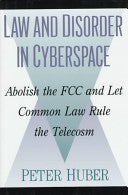1
/
of
1
Law And Disorder in Cyberspace by Peter W. Huber
Law And Disorder in Cyberspace by Peter W. Huber
Regular price
$13.50 NZD
Regular price
Sale price
$13.50 NZD
Unit price
/
per
Shipping calculated at checkout.
When the U.S. Congress created the Federal Radio Commission in 1927, what we now call cyberspace was just 'ether.' Broadcasting had only begun to carry tinny human voices and music across the fields and prairies, while Sunday afternoon phone calls to Aunt Mabel snaked through wires below, courtesy of an army of operators who switched each circuit by hand. It didn't take long, though, for the wires and airwaves to fill up with untrammeled chatter, so much so that by 1934 after complaints by the Navy that ship to shore communications had become hopelessly chaotic, and under the unproved but widely held belief that the broadcast spectrum was a finite natural resource all federal authority over electronic communications was forged into a new, powerful Federal Communications Commission. The amount of information traversing the airwaves has increased a million fold since 1927, but has the FCC changed along with the technology? The answer, according to Peter W. Huber, in Law and Disorder in Cyberspace: Abolish the FCC and Let Common Law Rule the Telecosm, is an emphatic No. In this well researched, lively, even witty polemic, Huber recounts the history of telecommunications over the last century to argue that the FCC 'should have been extinguished years ago.' With scarcity of communications channels no longer an issue, and the virtual elimination of distinctions between carriage and broadcast,the Commission's anachronistic laws have no basis for existence, and have in fact impeded growth and progress to the tune of billions of lost dollars. Today, the 'telecosm,' that complex universe of invisible communications traffic, has expanded, supplanted, and subdivided itself many times over with each new technological breakthrough. Cable television, direct broadcast satellite, cell phones, the V chip, Caller ID, personal computers, and the Internet have transformed the world. Huber argues that large bureaucratic entities like the FCC fail to adjust to such rapidly changing technologies because they see their mission as maintaining the status quo, and that instead of preserving the rights of common citizens they actually favor rich monopolies. Addressing charged points of conflict such as free speech vs. censorship, privacy vs. right to know, and market vs. controlled pricing, Law and Disorder in Cyberspace energetically proposes that sensible national telecommunications policies evolve through common law--the accretion of decisions arrived at in specific cases where basic principles such as private property and fair business practice are challenged and upheld--and not through the top down, government imposition of inflexible regulatory mandates created in the vacuum of uninformed, theoretical disussion. Given the heated climate on Capitol Hill surrounding debate over ways to reduce federal spending, Peter Huber's arguments are timely, urgent, and meticulously documented. Law and Disorder in Cyberspace is not only informative and entertaining, but will be one of those rare books that will influences public policy before the end of this decade. This 1997 Oxford University Press Hardback is in very good condition.
ISBN: 9780195116144 SKU: 1154793 Note: Any image shown is from a stock photo and is not the actual book.
SKU: 1154793
Location: Non Fiction
Location: Non Fiction
Share


